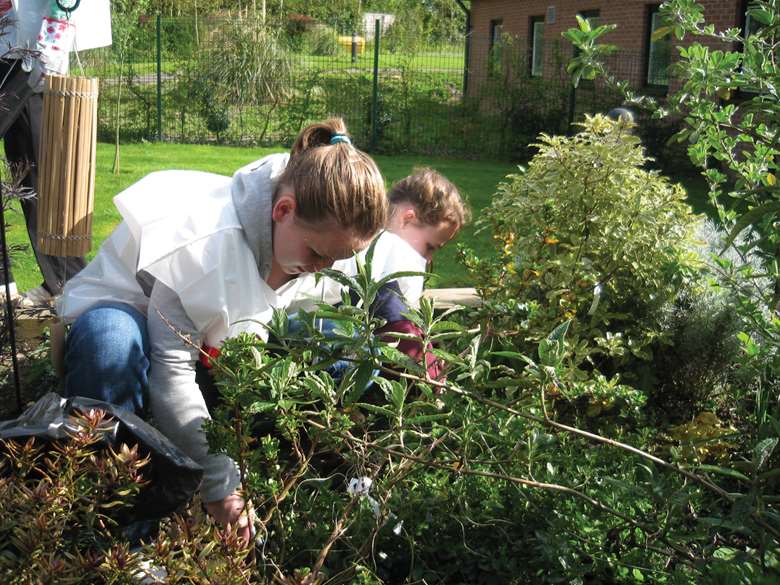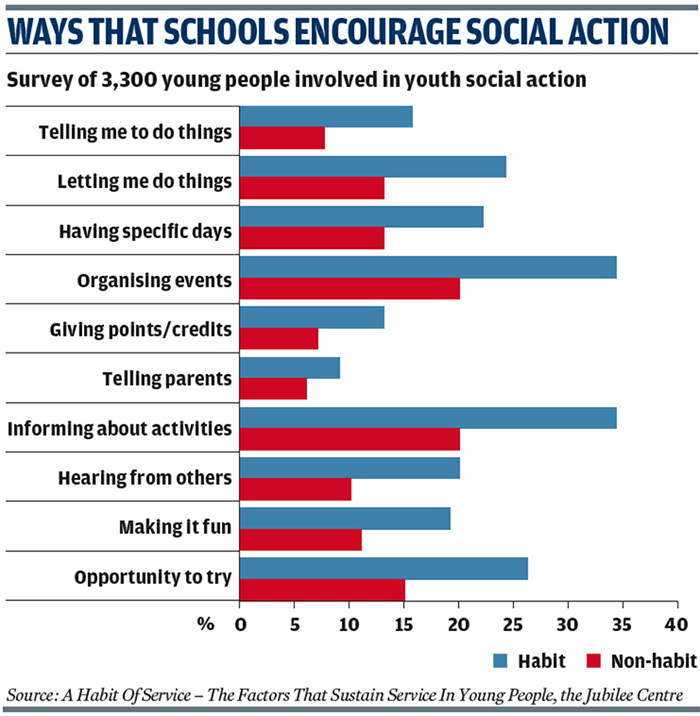Making volunteering a habit
Derren Hayes
Tuesday, November 28, 2017
Research has identified the key factors that influence long-term social action among young people.

Research by the Jubilee Centre identifies the key characteristics of young people who volunteer. Findings from the three-year study for the #iwill campaign, will be used to understand more about what a "habit" of service is for young people in the UK.
The report, A Habit Of Service - The Factors That Sustain Service In Young People, details findings drawn from a survey of 4,518 young people aged 16 to 20.
A young person with a habit of service is defined as someone who has taken part in social action in the past 12 months and confirms they will definitely or very likely continue participating in the next 12 months.
The purpose of the research was to generate new evidence on the characteristics of those that take part in youth social action to help voluntary organisations and policymakers understand what a habit of service looks like and to develop quality social action opportunities.
The research found that around a third of the young people surveyed were classed as having a habit of social action. By comparison, around 40 per cent volunteered, but did not have a habit of it.
The age at which a young person began volunteering was particularly crucial in developing a habit when they were older. A young person who first got involved in service under the age of 10 was 2.6 times more likely to be in the habit group than if they started aged 16 to 18.
Furthermore, those in the habit group were more likely to participate more frequently and in a wider range of activities than those in the non-habit group.
There was a positive association between parents' and guardians' participation in service and their children's participation. The percentage of those in the habit group who supported other people rose from 35 to 49 per cent when their parents were also involved.
Having friends who are involved is an even stronger influence, the research finds. When friends were involved, the percentage of those in the habit group tutoring, coaching or mentoring anyone almost doubles, rising from 32 to 57 per cent.
The study also identifies five key principles, outlined below, that are strong among young people that have developed a habit of youth social action.
1. Embedded
Those in the habit group were more likely to have support from their school, college or university to participate in youth social action - 34 per cent of the habit group said this was the main factor, compared with 20 per cent of the non-habit group. The second key factor was whether the school or college was proactive in communicating volunteering opportunities (see graphics).

2. Reflective
Young people in the habit group were more likely to reflect on their service experiences than those in the non-habit group. For example, 80 per cent of the habit group participants "agreed" or "strongly agreed" that they felt more responsible for their actions as a result of service; this figure decreased to 70 per cent among the non-habit group.
3. Youth led
Participants who had developed a habit for social action were more likely to say they had a chance to lead or encourage others than the non-habit group. Nearly three quarters of the habit group agreed that they felt they had a chance to lead either "a fair amount" or "a great deal" when asked. This dropped to 58 per cent among non-habit respondents.
4. Challenging
Those in the habit group were more likely to have found their service challenging and enjoyable. The differences between the habit and the non-habit groups was particularly pronounced in those who said they felt "a great deal" challenged by their service (26 per cent versus 17 per cent), and those who felt they enjoyed it "a great deal" (62 per cent versus 37 per cent).
5. Social impact
Habit group young people were more likely to recognise the double benefit of service - when asked about the community benefit their service had, 22 per cent said "a great deal" compared with 12 per cent for those in the non-habit group. This pattern was repeated when respondents were asked about personal benefits: 47 per cent versus 22 per cent.
Recommendations
- Schools and other institutions should consider how they can play a role in supporting young people to continue participating in service through key transition points, facilitating a journey of service throughout a person's life
- The opportunity to build a habit of service should be extended to adults as well as young people; given that the involvement of parents in service is related to their children's involvement this will enable a culture of service to become the norm
- A randomised controlled trial should be conducted in order to test whether increasing young people's perceived behavioural control over service improves their likelihood of taking part in the future.
Source: A Habit of Service, The Jubilee Centre




